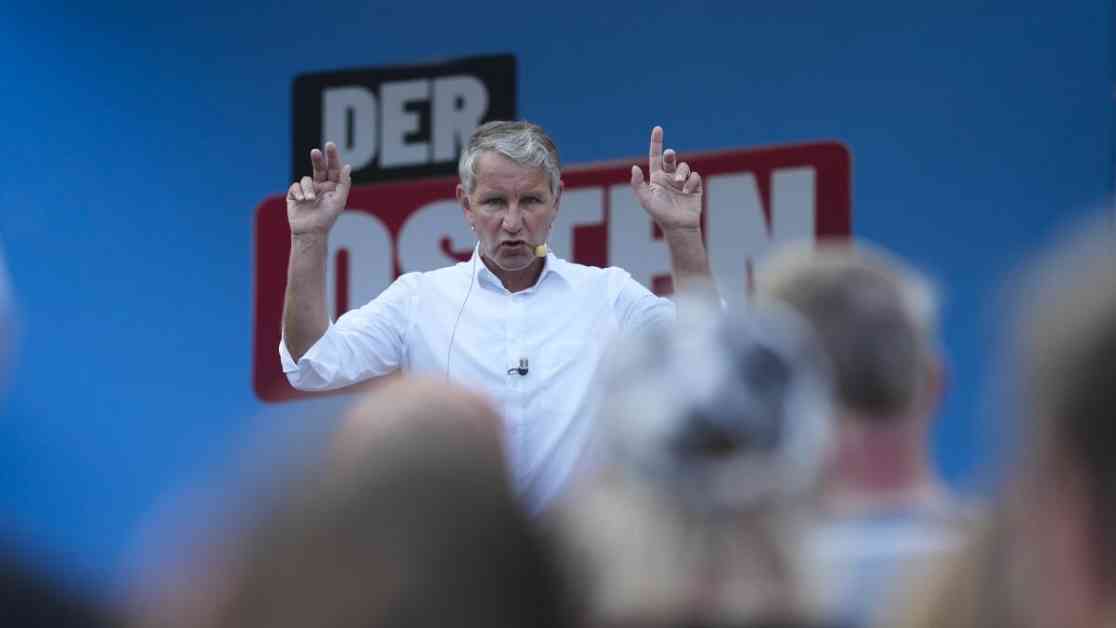Germany Far Right Expected to See Major Gains in Key State Elections
BERLIN — Germany’s political mainstream is once again facing the looming specter of far-right resurgence in the upcoming state elections. The Alternative for Germany (AfD), a populist-nationalist party with roots in anti-immigrant sentiments, is poised to make significant gains in two state elections in former East Germany this Sunday. A third vote in another eastern state is scheduled for later in September. If the AfD manages to secure the largest vote share in any of these elections, it would mark the first such triumph for a German far-right party at the state level since World War II.
The Rise of AfD
The AfD has undergone a rapid transformation over the past decade, evolving from a fringe movement to a prominent player in local and national politics. With its strong anti-immigrant stance and nationalist rhetoric, the party has resonated with many disillusioned voters in the eastern heartland of Germany. The AfD’s surge in popularity has raised concerns among the country’s political establishment and prompted fears of a seismic shift in the German political landscape.
Challenges to the Mainstream
The expected success of the AfD in the upcoming state elections poses a significant challenge to the traditional parties aligned with the governing coalition of Chancellor Olaf Scholz. Analysts attribute the AfD’s appeal to its ability to tap into deep-seated grievances in the eastern states, where economic disparities and feelings of neglect have fueled support for populist movements. The timing of the elections, coming on the heels of a high-profile stabbing incident involving a Syrian man, has further inflamed tensions over immigration and security issues.
Impact of Recent Events
The recent knife attack in Solingen, which claimed three lives and left several others injured, has reignited debates over immigration policies and border control in Germany. The suspect, an asylum seeker facing deportation, has been linked to the extremist group Islamic State, raising concerns about the potential for further terrorist threats in Europe. The attack has played into the far-right narrative of portraying immigrants as a security risk and has underscored the challenges faced by the German government in managing the influx of refugees and asylum seekers.
Political Responses
In response to the Solingen attack, Chancellor Scholz has called for tighter controls on irregular migration and expedited deportations for rejected asylum seekers. While his center-left party advocates for the right to seek asylum, it also acknowledges the need for more stringent border policies to address security concerns. The AfD, on the other hand, has called for a complete halt to all immigration and has capitalized on public fears over rising crime rates and cultural tensions.
Growing Divisions
The upcoming state elections highlight the deepening divisions within German society, particularly in the eastern regions where political grievances and economic disparities persist. A sense of alienation and resentment towards the political establishment has fueled support for both far-right and far-left parties, such as the Reason and Justice party (BSW), which is also expected to perform well in the upcoming elections. The rise of populist movements reflects a broader disillusionment with mainstream politics and a yearning for change among voters.
Challenges for Established Parties
As the AfD gains ground in the state elections, mainstream parties face the daunting task of addressing the concerns of voters who feel marginalized and neglected. The failure of established parties to effectively engage with issues such as immigration, economic inequality, and national identity has created an opening for populist movements to exploit public discontent and channel it into electoral success. The upcoming elections will test the resilience of the German political system and its ability to withstand the rising tide of right-wing populism.
The Legacy of the Past
The resurgence of far-right politics in Germany has raised uncomfortable echoes of the country’s dark history and the legacy of the Nazi era. The AfD’s flirtations with extremist rhetoric and symbols have alarmed many Germans and stirred memories of a painful past that the country has sought to overcome. The party’s association with nationalist sentiments and xenophobic attitudes has sparked fears of a return to a darker chapter in German history and has prompted calls for vigilance against the dangers of extremism and hate speech.
Conclusion
As Germany braces for the outcome of the upcoming state elections, the specter of far-right resurgence looms large over the political landscape. The AfD’s expected gains in the eastern states signal a growing discontent with the status quo and a desire for change among voters. The rise of populist movements reflects a broader trend in European politics, where mainstream parties are struggling to address the complex challenges of a rapidly changing society. The outcome of the elections will have far-reaching implications for Germany’s future direction and its ability to navigate the turbulent waters of populism and extremism.



























